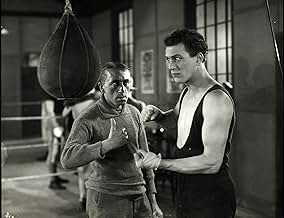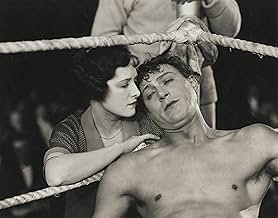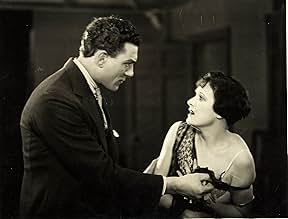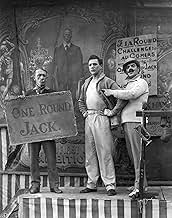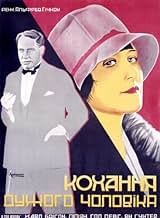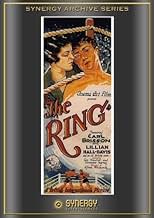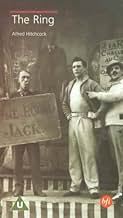IMDb रेटिंग
6.1/10
4.2 हज़ार
आपकी रेटिंग
अपनी भाषा में प्लॉट जोड़ेंTwo boxers compete for the love of a woman.Two boxers compete for the love of a woman.Two boxers compete for the love of a woman.
- निर्देशक
- लेखक
- स्टार
Lillian Hall-Davis
- The Girl
- (as Lilian Hall Davis)
Eugene Corri
- Eugene Corri
- (बिना क्रेडिट के)
Charles Farrell
- Second
- (बिना क्रेडिट के)
Clare Greet
- Fortune Teller
- (बिना क्रेडिट के)
Lawrence Hanray
- Clerrgyman in Black Cassock
- (बिना क्रेडिट के)
Tom Helmore
- Spectator
- (बिना क्रेडिट के)
Alfred Hitchcock
- Man-Dipping Attraction Worker
- (बिना क्रेडिट के)
Minnie Rayner
- Boxing Contestant's Wife
- (बिना क्रेडिट के)
Brandy Walker
- Spectator
- (बिना क्रेडिट के)
Bombardier Billy Wells
- Boxer
- (बिना क्रेडिट के)
फ़ीचर्ड समीक्षाएं
"The Ring" is a surprisingly torpid little film which I thought was not one of The Master's better efforts. Yes, yes, I know, there were some of his signature cinematic compositions and visual touches, but the play's the thing, right? This was pretty ordinary subject matter for someone with Hitch's reputation - love triangle, jealousy, revenge, etc. There were no surprises, no maguffins, no suspense, just plodding drama.
Maybe the best part of this film is the casting. I enjoyed watching Carl Brisson very much as the cuckolded husband, "One-Round Jack" and the always affable Ian Hunter - even when playing a cad, although he is slightly paunchy for a heavyweight champ. Hitch also got a lot of mileage from the entertaining Gordon Harker as Jack's second.
But I disagree with some reviewers that this was one of Hitchcock's better silents. "The Manxman" is a far superior film, and also stars Brisson as a cuckolded husband. That was a story you could get your teeth into; not so with "The Ring", which was pure pablum.
Maybe the best part of this film is the casting. I enjoyed watching Carl Brisson very much as the cuckolded husband, "One-Round Jack" and the always affable Ian Hunter - even when playing a cad, although he is slightly paunchy for a heavyweight champ. Hitch also got a lot of mileage from the entertaining Gordon Harker as Jack's second.
But I disagree with some reviewers that this was one of Hitchcock's better silents. "The Manxman" is a far superior film, and also stars Brisson as a cuckolded husband. That was a story you could get your teeth into; not so with "The Ring", which was pure pablum.
7sol-
The story here is very slight, but it is told well by Hitchcock, with excellent choices of lighting and distances and a number of neat tricks. The editing is excellent, with dissolves effectively used throughout, and the simple cuts are perfectly timed. There is some clever image distortion, superb photography in general, and the film even manages to include some apt comedy relief, thanks largely to Gordon Harker's comic acting abilities. There is a dream sequences that is arguably poorly handled, and the story is downright predictable, but generally it is hard to hold anything against this early Hitchcock silent film.
This early film has its flaws-- a predictable plot and some overlong scenes of dubious relevance-- but it already clearly demonstrates Hitchcock's mastery of editing and the use of powerful images. It's also among the most expressionist of his films stylistically; note, for examples, the weird distortions he uses during the party sequence and the frequent echoes of both title and plot in the imagery.
Its core, though, remains the final match, which is still among the more exciting examples of cinematic boxing. Even though you know that the hero has to win, it becomes quite believable that he will lose, and the movement of his wife from the champion's corner to his, motivating the final plot pay-off, is very well entwined with the progress of the match. The inserts of the stopwatch do exactly what they should; you can almost hear the ticking (even though this is a silent film, the visuals often have a surprisingly auditory feel to them). The pacing becomes astonishingly rapid, and the viewer gets sucked into the excitement and brutality of both the match and the sexual jealousy which underlies it.
The only DVD release with which I am familiar is that of Laserlight, a public domain company. As with each Hitchcock silent they've released, they've attached various musical selections, mostly orchestral, to the action. The sound editing is frequently sloppy, and the sound quality varies widely, but some genuine care seems to have gone into most of the actual choices, and the music accompanying the final match works extremely well; it is unlikely that this sequence will ever be better accompanied than it is here.
This is a much more impressive film than its present obscurity would suggest. It deserves an honorable place in both the Hitchcock canon and the slender list of worthwhile boxing films.
Its core, though, remains the final match, which is still among the more exciting examples of cinematic boxing. Even though you know that the hero has to win, it becomes quite believable that he will lose, and the movement of his wife from the champion's corner to his, motivating the final plot pay-off, is very well entwined with the progress of the match. The inserts of the stopwatch do exactly what they should; you can almost hear the ticking (even though this is a silent film, the visuals often have a surprisingly auditory feel to them). The pacing becomes astonishingly rapid, and the viewer gets sucked into the excitement and brutality of both the match and the sexual jealousy which underlies it.
The only DVD release with which I am familiar is that of Laserlight, a public domain company. As with each Hitchcock silent they've released, they've attached various musical selections, mostly orchestral, to the action. The sound editing is frequently sloppy, and the sound quality varies widely, but some genuine care seems to have gone into most of the actual choices, and the music accompanying the final match works extremely well; it is unlikely that this sequence will ever be better accompanied than it is here.
This is a much more impressive film than its present obscurity would suggest. It deserves an honorable place in both the Hitchcock canon and the slender list of worthwhile boxing films.
The symbolic use of objects, form editing, the position of characters in the scene... these were all used with such joyous abandon by Hitchcock that you can really see what a fertile genius he had. The way the wife moves from one corner of the ring to the other as the fight progresses, the editing when the wedding ring is placed on her finger... while these may seem a bit obvious by todays standards, in the silent era they spoke volumes about the story without a word being spoken. Even the title has a least four meanings that I can see; the boxing ring, the wedding ring, the bracelet the lover buys, and the love triangle at the heart of the story.
"The Ring" is, for me, Hitchcock's best silent feature. It is a nippy little romance which sprints along with a surprisingly swift pace.
There's the typical early Hitch experimentation - the camera getting "knocked out" in a boxing scene is a prime example and some fine comedic moments in what is otherwise a pretty serious story of love and betrayal although, with the boxing backdrop, the rather mundane story is slightly more exciting.
Less gimicky than the more famous "The Lodger", and therefore more believable, "The Ring" is an underrated, early effort from the man who went on to become one of the most celebrated directors in the world.
NB. Catch hold of the BFI release of this video if you can - the score is superb and by far the best new music I have heard composed for a silent movie.
There's the typical early Hitch experimentation - the camera getting "knocked out" in a boxing scene is a prime example and some fine comedic moments in what is otherwise a pretty serious story of love and betrayal although, with the boxing backdrop, the rather mundane story is slightly more exciting.
Less gimicky than the more famous "The Lodger", and therefore more believable, "The Ring" is an underrated, early effort from the man who went on to become one of the most celebrated directors in the world.
NB. Catch hold of the BFI release of this video if you can - the score is superb and by far the best new music I have heard composed for a silent movie.
क्या आपको पता है
- ट्रिवियाAccording to the dialogue card at 1:19:06, the big fight between Jack Saunders and Bob Corby was refereed by Eugene Corri, who entered the ring wearing a tux. Corri made boxing history in December 1907 by being the first referee to referee inside the ring during a fight.
- गूफ़During the first boxing scene, when the assistant is helping the sailor put on his coat, the coat is on nearly all the way; then, in the next shot, it is shown being put back on again.
- भाव
The Promoter: If you win this next fight with the nigger, you'll be in the running for the championship.
- कनेक्शनFeatured in Silent Britain (2006)
टॉप पसंद
रेटिंग देने के लिए साइन-इन करें और वैयक्तिकृत सुझावों के लिए वॉचलिस्ट करें
- How long is The Ring?Alexa द्वारा संचालित
विवरण
- रिलीज़ की तारीख़
- कंट्री ऑफ़ ओरिजिन
- भाषा
- इस रूप में भी जाना जाता है
- Cuadrilátero
- फ़िल्माने की जगहें
- उत्पादन कंपनी
- IMDbPro पर और कंपनी क्रेडिट देखें
- चलने की अवधि1 घंटा 56 मिनट
- ध्वनि मिश्रण
- पक्ष अनुपात
- 1.33 : 1
इस पेज में योगदान दें
किसी बदलाव का सुझाव दें या अनुपलब्ध कॉन्टेंट जोड़ें


